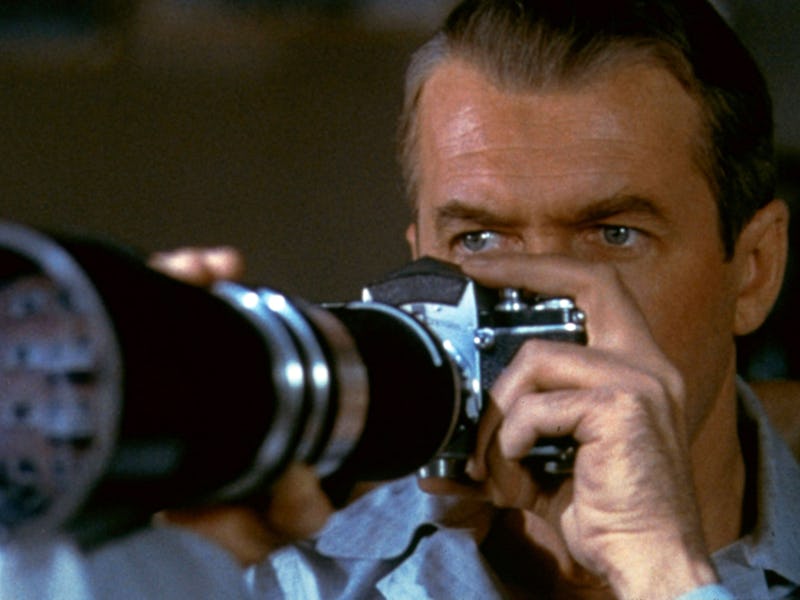Hitchcock’s Suspense Masterpiece Predicted Our Modern True Crime Obsession
Rear Window remains as timely as ever.

At the time of this writing, two of the top 5 TV shows on Netflix are documentary series based on someone either murdering (or attempting to murder) their romantic partner. About a fifth of the top 25 podcasts on Spotify are devoted to deep dives into brutal crimes both famous and (relatively) forgotten. YouTube channels that range from lengthy video essays on macabre real-life events all the way to simple compilations of police body cam footage rack up millions of subscribers. The best-selling nonfiction on Amazon is predominantly self-help fare, but jarringly nestled amid the wannabe gurus are books about nightmarish scenarios and bloody conflict. The “true crime” genre is not a niche subject matter. We are truly obsessed with it.
It was something that director Alfred Hitchcock realized long before many others, working in an industry and during a time period that seemed excessively devoted to the idea of the “happy ending” as a necessity. Hitchcock had his share of uplifting conclusions, but the throughline of his work is a fascination with murder. Not necessarily in committing it, of course, but in the voyeurism of it. We can’t help ourselves and in 2024, our entertainment has become the televised equivalent of slowing down to look at a car crash. And no film of Hitchock’s better illustrates where we are today than Rear Window, which hits its 70th anniversary this year.
Released on September 1, 1954, Rear Window tells the story of L.B. Jefferies (Jimmy Stewart,) a photographer that has been trapped in his apartment thanks to a broken leg. So, to bide the time between visits by his girlfriend Lisa Fremont (Grace Kelly), he has taken to using his camera lens and some binoculars to spy on his neighbors that live across the courtyard. Most of their lives are interesting but average — a dancer annoying an older downstairs tenant, a frustrated piano player, a lonely woman, and some horny newlyweds. But amidst the mundane activity, Jefferies stumbles across what seems to be a traveling salesman that has murdered his sick wife and disposed of her body.
And so Jefferies, driven more by boredom than any sense of heroic altruism, decides to find out what really happened. Jimmy Stewart is fantastic in the role, lending an everyman energy to what eventually becomes a claustrophobic thriller. It’s something that Stewart was known for — from the mid-life crisis in It’s A Wonderful Life to the small town camaraderie in The Man Who Shot Liberty Valance, Stewart felt like pure Americana. And so we relate to him and his wandering hobbies, even when he dives into a plot that we fear he may not emerge alive from.
Though becoming convinced that your neighbor (even one played with such towering intensity as Raymond Burr’s Thorwald in Rear Window) has carved up his wife might sound like an outsized example, the paranoia that Jefferies feels has only become more inescapable today. Psychologists have studied how consuming a lot of true crime can change how we view the world — everyone becomes a potential threat, even people that you’ve known for a while. Combine this with the fact that Americans now have a fairly widespread distrust of their own neighbors, and we’ve become a nation full of Jefferies, all warily watching strangers and looking for ways they might hurt us.
Despite the limited set and confined quarters, Rear Window is immaculate.
As a movie, Rear Window is immaculately constructed. Hitchcock had always been interested in the aforementioned “watching,” but here he gets to truly test what it’s like for someone to gaze upon people: all of the lingering stares and the quick, nervous moves when you think you’ve been noticed back. Despite not having typical sets to work with (we’re mostly stuck with Jefferies in his apartment, and all we see of the adjacent building across the courtyard is what we’d be able to see from Jefferies’ window or his camera lens), he builds suspense thanks to the fact that he pulls us in as watchers, too. And when Thorwald realizes that he’s being stalked himself and looks up and directly into Jefferies’ camera (and thus the movie camera as well,) the chill we feel is one of borderline complicity.
“What do you want from me?” Thorwald implores to us, and neither we, nor Jefferies, really have an answer. There’s no definitive reason as to why we’re so fascinated by true crime — the closest we get is that we become enveloped in the rollercoaster of trying to find answers and then attain justice, and even that doesn’t really tackle how we’ve managed to turn something so lurid into commonplace streaming service and podcast fare. Throughout his films, Hitchcock himself gave a variety of answers, but Rear Window comes the closest to what we deal with today, whether it’s the TV screen or our neighbor’s windows. We just can’t seem to look away.